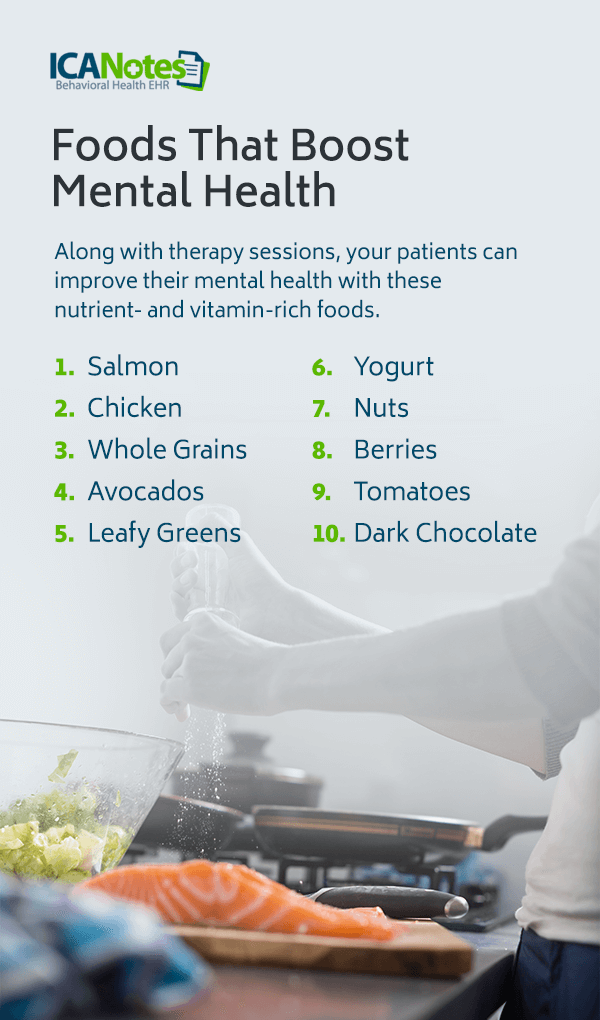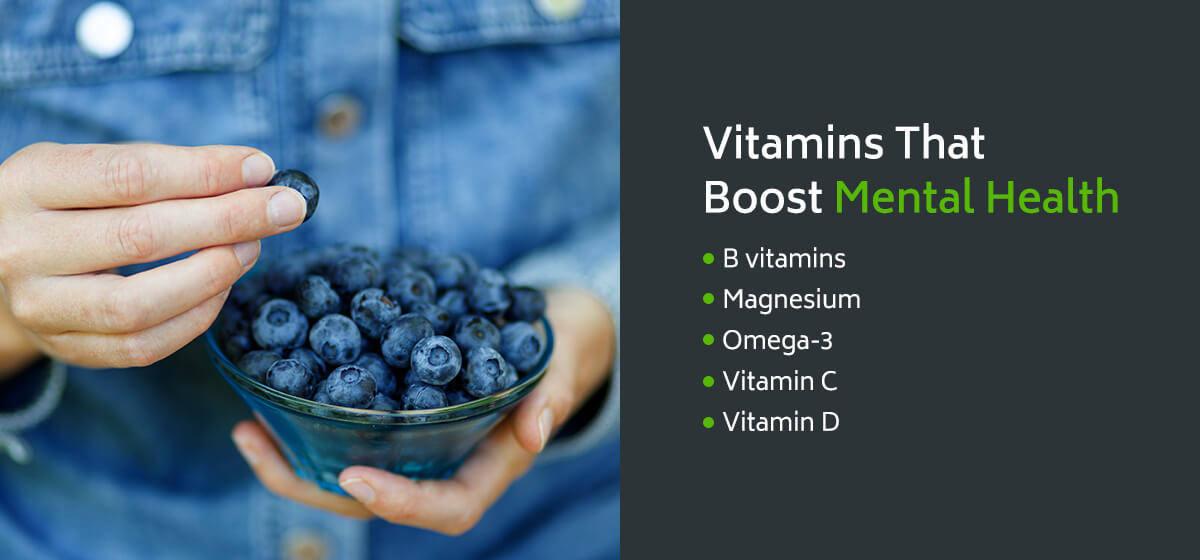Blog > Treatment Strategies > 10 Best Foods for Mental Health and Mood Support
10 Best Foods for Mental Health and Mood Support
What you put on your plate doesn’t just fuel your body — it directly impacts your brain and emotional well-being. Research consistently shows a strong link between food and mental health, highlighting how certain nutrients can regulate mood, improve concentration, and support resilience against stress. If you’ve ever wondered which foods are good for mental health or which choices truly qualify as the best foods for mental health, you’re not alone. From omega-3-rich fish to antioxidant-packed berries, science points to clear dietary patterns that act as natural foods that improve mood. In this guide, we’ll explore ten powerful foods that boost your mood and explain how they can be incorporated into both everyday meals and clinical treatment plans.

Last Updated: October 2, 2025

The Link Between Food and Mental Health
The connection between diet and mental well-being goes far beyond old sayings like “you are what you eat.” Modern studies confirm that specific dietary choices influence neurotransmitter production, brain inflammation, and even the gut-brain axis — all of which play a role in emotional stability and cognitive function. In fact, many clinicians now emphasize that the link between food and mental health is a critical piece of holistic care. Diets rich in whole foods, healthy fats, and probiotics are consistently associated with lower rates of depression and anxiety, while highly processed foods are linked to worsened mood and fatigue. By understanding how foods that improve mood work biologically — from boosting serotonin to reducing oxidative stress — both individuals and mental health professionals can use nutrition as a practical tool for promoting long-term well-being.
Vitamins That Boost Mental Health
Numerous vitamins and nutrients have been found to positively impact mental health and mood. Incorporating foods with these vitamins into a diet can help improve brain function and mental health:
- B vitamins: B12 and B9 (folate) are well-known for influencing mental health and mood. B vitamins are necessary to produce neurotransmitters like serotonin and dopamine, which contribute to pleasure and overall mood.
- Magnesium: This vitamin helps regulate the nervous system. Adding magnesium to a diet can help reduce the risk of depression.
- Omega-3: Fatty acids like omega-3 can contribute to improved mood disorders and neurotransmitter function to boost mental state.
- Vitamin C: In addition to boosting the immune system, vitamin C can impact energy levels, mood, anxiety and mental function.
- Vitamin D: Many mental health conditions have been associated with low vitamin D levels. Adding this vitamin to a diet can help improve brain function and mood.
10 Best Foods for Mental Health and Mood
While many of those vitamins can be supplemented, your patients may prefer to consume them more naturally. Along with therapy sessions, your patients can improve their mental health with these nutrient- and vitamin-rich foods.
1. Salmon and Other Fatty Fish
Salmon, mackerel, tuna, herring, and sardines are among the best foods for mental health thanks to their high levels of omega-3 fatty acids. These healthy fats support brain cell communication and have been shown to reduce symptoms of depression and anxiety. As a food good for mental health, salmon also helps stabilize mood by supporting serotonin production, making it a staple for those looking to eat foods that boost your mood.
2. Chicken
Lean proteins like chicken provide tryptophan, an amino acid your body uses to produce serotonin — the “feel-good” neurotransmitter. The brain uses serotonin to help manage mood, maintain memory and fight mental disorders like depression. This makes chicken a versatile food good for mental health that helps improve mood stability and sleep quality. Incorporating chicken into balanced meals supports clients looking for everyday foods that improve mood. Chicken also contains other valuable nutrients for the brain, like vitamin B and magnesium.

3. Whole Grains
Oats, quinoa, and brown rice are complex carbohydrates that provide steady energy and aid serotonin production. The brain and body need complex carbohydrates like these to encourage slow glucose production and provide consistent energy. More often, however, many people consume simple carbs and experience spiked blood pressure, which is associated with several mental health disorders. Whole grains are reliable foods that boost your mood, helping to prevent irritability and fatigue. Choosing them over refined carbs is a simple step toward better food for mental health. Whole grains also assist with tryptophan absorption. So, when eating whole grains with turkey or chicken, your patients set their brains up for better success in reducing depression and anxiety symptoms.
4. Avocados
Avocados are nutrient powerhouses packed with healthy fats, fiber, and nearly 20 vitamins and minerals which contribute to brain health. They help regulate neurotransmitters and reduce inflammation, which makes them a prime example of a food good for mental health. Avocados contain high amounts of lutein which has been linked to having positive brain impacts, as well as lots of folate and vitamin K which help to improve mood, memory, and concentration. As a versatile food that boosts your mood, avocados can be added to salads, smoothies, or eaten on their own.
5. Leafy Greens
Spinach, kale, and Swiss chard are packed with folate, a B vitamin essential for neurotransmitter function. Low folate levels have been linked to depression, making leafy greens an easy, nutrient-dense choice for foods that improve mood and reduce the risk of dementia. Dark leafy greens are also high in omega-3s, magnesium and other nutrients, making them a well-rounded brain food. Adding greens daily is one of the simplest ways to enjoy food good for mental health.
6. Yogurt and Other Fermented Foods
Yogurt, kefir, and other fermented foods are rich in probiotics that promote a healthy gut microbiome. Since gut health is directly linked to mood and brain function, these are some of the most impactful foods good for mental health. Regularly consuming foods that boost your mood like yogurt, kefir, and kimchi may help reduce stress and anxiety and improve emotional regulation. Yogurt also contains magnesium and potassium, which help oxygen travel to the brain. With more oxygen in the brain, it can function more effectively. Vitamin D is found in yogurts, too, further helping to support mood.
7. Nuts and Seeds
Almonds, walnuts, cashews, chia seeds, and flaxseeds provide a powerful combination of omega-3s, magnesium, and antioxidants. These nutrients lower inflammation and promote calmness, which can help to ease depression symptoms and support brain function. Many nuts also contain high doses of magnesium, which helps get oxygen to the brain. Other nuts, like almonds, contain phenylalanine, which helps the brain produce neurotransmitters like norepinephrine that can improve mood. Phenylalanine is also believed to help reduce Parkinson's Disease symptoms. This makes nuts and seeds some of the top foods that boost your mood naturally. For clients seeking snack options that double as foods that improve mental health, nuts and seeds are an easy win.
8. Berries
Blueberries, strawberries, and raspberries are antioxidant-rich foods that improve mood by reducing oxidative stress and inflammation in the brain. Studies have shown that antioxidants from foods like berries can help prevent and reduce depression symptoms. Antioxidants have also been associated with helping anxiety and other mental health issues. The natural compounds in berries also support memory and protect against cognitive decline, making them both delicious and highly effective foods good for mental health.
9. Tomatoes
Tomatoes are rich in lycopene, an antioxidant linked to reduced inflammation and improved brain function. Lycopene, the phytonutrient responsible for a tomato's red color, is extremely beneficial in many areas of health. For example, it may help the body fight brain disease, prevent cell damage associated with Alzheimer's Disease, and benefit concentration, attention, memory and logic. Tomatoes also contain beneficial amounts of folic acid and folate, which prevents homocysteine from building up in the body. Homocysteine prevents neurotransmitters like dopamine and serotonin from producing in the brain, so folic acid from tomatoes supports the brain in neurotransmitter production. Tomatoes are particularly valuable as a food good for mental health, with studies suggesting they may help protect against depression. Incorporating fresh tomatoes into salads, sauces, or snacks is a flavorful way to eat foods that improve mood.
10. Dark Chocolate
Dark chocolate is high in flavonoids that improve circulation to the brain and lower stress. Dark chocolate and flavonoids can positively affect mood, memory, attention and the ability to fight cognitive decline as your patients age. The darker the chocolate, the more cocoa, which means more antioxidants. To be most beneficial, dark chocolate should contain 85% cocoa or more. While it feels like an indulgence, it’s also a science-backed food that improves mood. A small serving can reduce anxiety, enhance focus, and provide a satisfying way to enjoy foods that boost your mood.
Frequently Asked Questions: Foods That Boost Mental Health
Making Meals With Foods for Mental Health
The connection between diet and emotional well-being is undeniable. From omega-3-rich salmon to antioxidant-packed berries, these ten foods good for mental health are simple, evidence-based ways to help regulate mood, improve focus, and support resilience against stress. By choosing the best foods for mental health, clients can experience more balanced energy and emotional stability — proving that there really is a science-backed link between food and mental health.
Your patients can turn many of these items into well-rounded meals or include them in their favorite dishes. For example, a berry and dark chocolate parfait is a great way to give the brain valuable nutrients first thing in the morning. Or, add several ingredients on this list, like chicken or salmon, avocado, tomato and nuts, to a leafy green salad.
There are nearly limitless ways to incorporate these foods into a diet. Encourage your patients to add one or more of these foods to their grocery list. Set a goal for them to brainstorm a mental health meal plan that's feasible for them to cook, prepare and enjoy.
Document Healthy Food Interventions in Treatment Plans — the ICANotes Advantage
When you’re helping a patient integrate nutritional strategies to support mental health, documenting the “why,” “what,” and “how” clearly and efficiently is crucial. That’s where ICANotes really shines
Why it matters
-
Nutrition-related goals may feel less “clinical” than typical behavioral targets, but they still play a vital role in comprehensive mental health care. By documenting them rigorously, you validate their importance, reinforce accountability, and support collaboration (patient, dietician, PCP).
-
Should you ever need to demonstrate standard-of-care or integration of lifestyle-based interventions (for reimbursement, audits, or clinical supervision), having these food-related goals and progress notes built into your system is a huge plus.
-
When patients see you treating nutrition as a legitimate part of their treatment plan, it helps them internalize the idea that mental health is holistic — not just about therapy or medication.
How ICANotes makes it easy
-
Structured treatment plan templates
You can build or customize a template category (e.g. “Lifestyle & Nutrition”) that aligns with your practice’s model. Then, quickly drop in specific goals like “increase dark leafy greens to 5 servings/week” or “replace refined snacks with nuts/berries 3x per week.” -
Linking interventions, progress, and notes
Because ICANotes ties each treatment plan goal to progress notes, you can — in the same system — document what dietary strategies you reviewed, any barriers the patient mentioned, and objective indicators of progress (e.g. patient food diary, lab results, self-report). -
Cross-discipline collaboration
If your patient is also seeing a dietitian, you can import or copy goals, note shared interventions, or track whether a nutritional plan is being adhered to in therapy sessions — all without duplicative charting or fragmented care notes. -
Reminders, flags, and alerts
ICANotes supports setting reminders or flags on under-addressed goals. So if a nutrition goal hasn’t been revisited in X sessions, the system can prompt you to check in, keeping these interventions from falling off the radar. -
Outcome tracking & reporting
Over time, you can run reports on how often nutrition goals were set, how frequently they showed progress, or whether patients who engaged with dietary components showed greater improvement. These kinds of data can support QI (quality improvement) efforts, justify integrated care models, or inform your practice marketing. -
Ease of use and clinician efficiency
All of this lives in the same EMR/charting environment. You don’t have to toggle between separate diet logs or external trackers — everything is embedded, secure, and available at charting time with minimal extra clicks.
With ICANotes, you can transform how you document and track holistic interventions like nutrition — start your free trial today and see the difference it makes in your workflow and patient care.
Start Your 30-Day Free Trial
Experience the most intuitive, clinically robust EHR designed for behavioral health professionals, built to streamline documentation, improve compliance, and enhance patient care.
- Complete Notes in Minutes - Purpose-built for behavioral health charting
- Always Audit-Ready – Structured documentation that meets payer requirements
- Keep Your Schedule Full – Automated reminders reduce costly no-shows
- Engage Clients Seamlessly – Secure portal for forms, messages, and payments
- HIPAA-Compliant Telehealth built into your workflow
Complete Notes in Minutes – Purpose-built for behavioral health charting
Always Audit-Ready – Structured documentation that meets payer requirements
Keep Your Schedule Full – Automated reminders reduce costly no-shows
Engage Clients Seamlessly – Secure portal for forms, messages, and payments
HIPAA-Compliant Telehealth built into your workflow
Related Posts
About the Author
Dr. October Boyles is a behavioral health expert and clinical leader with extensive expertise in nursing, compliance, and healthcare operations. With a Doctor of Nursing Practice (DNP) and advanced degrees in nursing, she specializes in evidence-based practices, EHR optimization, and improving outcomes in behavioral health settings. Dr. Boyles is passionate about empowering clinicians with the tools and strategies needed to deliver high-quality, patient-centered care.












[…] love salmon. Whether fillets or smoked, this delicious fish contains Omega-3, which has been related to boosting the mind. It also contains vitamin D, which tends to give people a bit of a boost too. […]